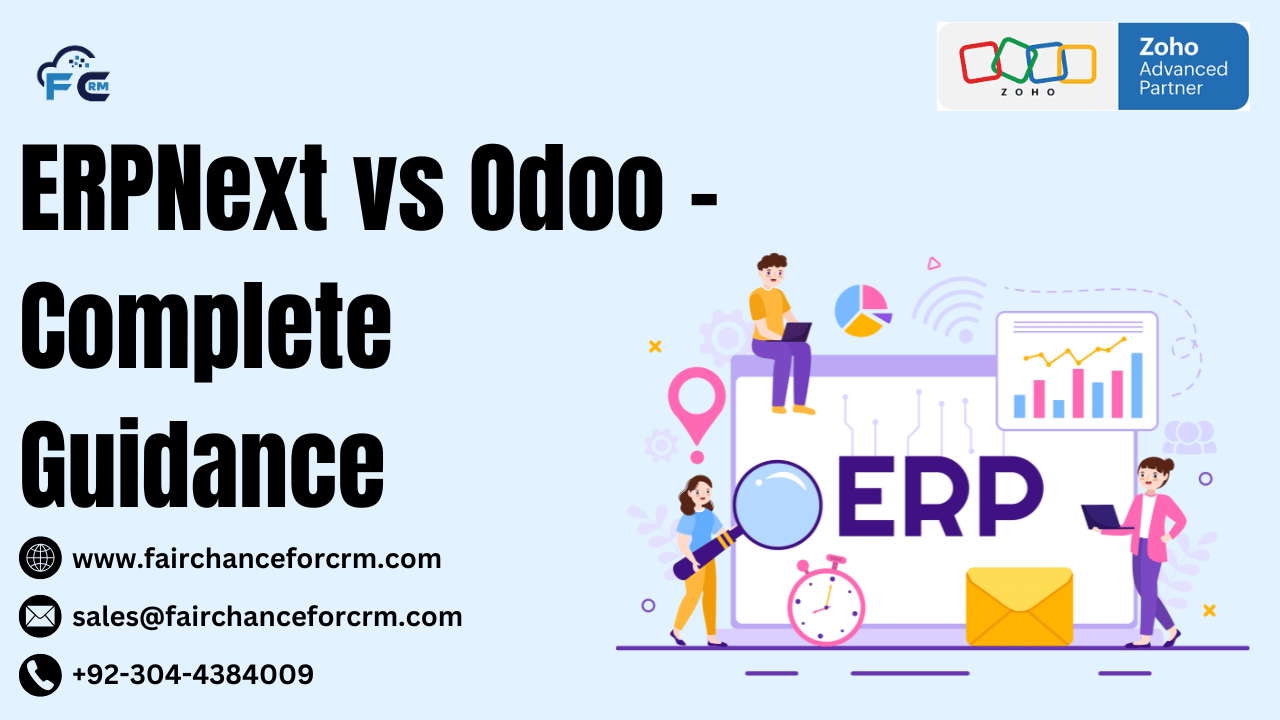ERPNext vs Odoo is our today topic. When it comes to selecting an Enterprise Resource Planning (ERP) system, two of the most popular open-source options are ERPNext and Odoo. Both offer a comprehensive range of business administration capabilities, such as accounting, inventory management, sales, CRM, human resources, and more. However, each system has strengths and drawbacks that vary based on the demands of the business. This article compares the essential features, advantages, and disadvantages of ERPNext and Odoo.
Also Read:
- How to Create a Custom Revenue Report in Odoo
- Subscription Services in Odoo
- A Guide to Transferring Filestore from Odoo to Odoo Container
- How to Secure Your Online Accounts Using Zoho Vault and Zoho OneAuth?
- How CRM Solutions Drive Client Growth for Mortgage Businesses?
Overview: ERPNext vs Odoo
ERPNext:
ERPNext is an open-source ERP designed for small to medium-sized businesses. It has a variety of features such as accounting, inventory management, human resources, manufacturing, and project management. ERPNext, which is built on Python and JavaScript, has an intuitive UI and is well-known for its ease of use and customization.
Odoo:
Odoo is one of the most popular ERP systems globally, with a modular design that allows businesses to pick and choose the features they need. It provides a vast array of business applications, from sales and finance to inventory and HR. Odoo is written in Python and uses PostgreSQL as its database backend.
Ease of Use
- ERPNext: Known for its simplicity, ERPNext offers a clean and easy-to-navigate user interface. The system is intended to be user-friendly, with minimal configuration required to get started. It’s suitable for businesses that don’t need a lot of customization out of the box.
- Odoo: Odoo also offers a user-friendly interface, but its complexity increases as you add more modules. For businesses that need a highly flexible and customizable solution, Odoo might require more technical expertise to set up and maintain.
Features and Modules for ERPNext vs Odoo
- ERPNext: ERPNext includes a wide range of built-in modules for accounting, inventories, manufacturing, human resources, project management, CRM, and more. However, it is sometimes seen as less feature-rich compared to Odoo in certain areas, especially in non-core modules such as marketing and eCommerce.
- Odoo: Odoo shines in its extensibility. It features over 30 major programs and thousands of community-created apps that cover practically every element of business administration. Whether you need a robust eCommerce platform, advanced project management tools, or specialized manufacturing features, Odoo likely has a module or app for it.
Customization and Flexibility
- ERPNext: ERPNext is highly customizable but offers fewer modules than Odoo out of the box. Customization is typically done using Python and JavaScript, and while it can meet the needs of many businesses, it may not have as many options as Odoo when it comes to third-party apps and advanced configurations.
- Odoo: Odoo is known for its flexibility. The modular structure means businesses can start with only the apps they need and expand as they grow. Customization options are vast, and with a large community of developers, it’s easier to find solutions or third-party integrations. However, customization may require more technical skills, particularly for complex configurations.
ERPNext vs Odoo: Pricing
- ERPNext: ERPNext is open-source and free to use for self-hosted versions, making it an attractive option for businesses on a tight budget. However, for additional services such as hosting, support, or using the cloud version, there are subscription fees.
- Odoo: Odoo’s core is open-source, but the full range of features, especially advanced modules, is available only through paid versions. Odoo’s pricing is subscription-based, and the cost varies depending on the number of apps and users. The paid model can become expensive for businesses that require many modules.
Community and Support
- ERPNext: ERPNext has a growing and supportive community, with plenty of online resources, forums, and documentation available. However, since it is less widely used than Odoo, finding dedicated professionals and support might be more challenging.
- Odoo: Odoo has one of the largest ERP communities, with a vast amount of online resources, training, and third-party experts. The company also offers professional support and consultancy services at a cost, making it more accessible for businesses that need specialized assistance.
Scalability
- ERPNext: ERPNext is suitable for small to medium-sized businesses and can scale as the business grows. However, for large enterprises with complex needs, it might face some limitations in terms of flexibility and advanced features.
- Odoo: Odoo is highly scalable and is used by businesses of all sizes, from startups to large enterprises. The ability to add more apps and advanced features makes Odoo a robust option for organizations with complex requirements.
Conclusion
Both ERPNext vs Odoo are excellent ERP systems, and the best choice depends on your business needs. ERPNext is a great choice for small to medium-sized businesses that require an easy-to-use, affordable solution with core business functions. Odoo, on the other hand, offers a more flexible, modular approach, with a wide range of applications and scalability that make it suitable for businesses of all sizes.
If you’re looking for simplicity and cost-efficiency, ERPNext might be the better option. If you need a highly customizable, feature-rich ERP system with a large number of available modules, Odoo is a strong contender.
For more information about the ERPNext vs Odoo, visit this link.
If you want to Free Trail Zoho, click on this link.




